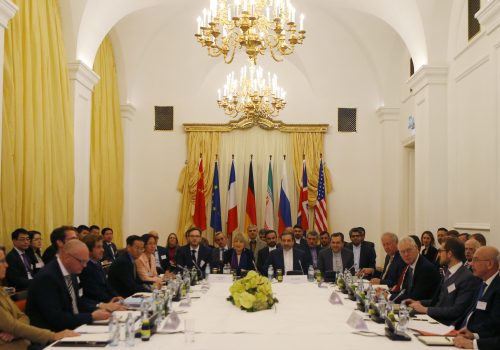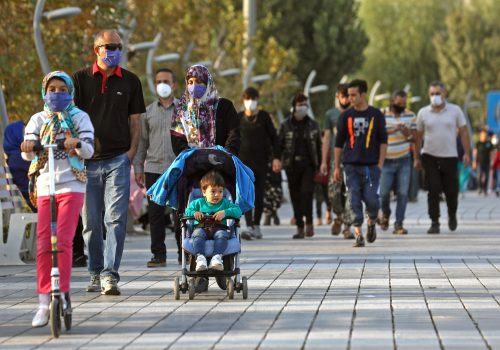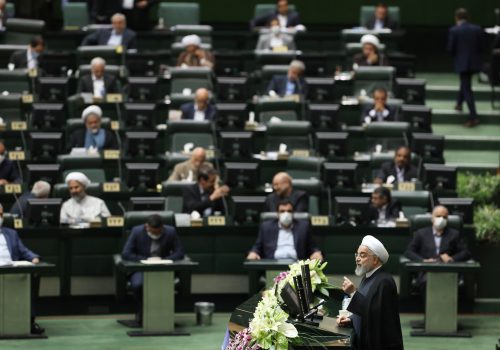The US election was all Iranians talked about for the past week
“The electoral points in Wisconsin are more important!”
“My aunt lives in Michigan. She says there is a lot of fraud there!”
The comments are from a cartoon depicting just how much Iranians follow and care about the US presidential election. The cartoon is part of a myriad of jokes and memes circulating on Persian language social media and family WhatsApp groups during the past week, all demonstrating just how deep the 2020 election permeated into Iranian society and culture.
Given the competitive authoritarian nature of their own politics, US elections are much more suspenseful to watch for Iranians. But that’s not the only reason why they were paying attention. US elections have long had an outsized impact on the lives of Iranians, but last week’s election came after years in which they had suffered under President Donald Trump’s “maximum pressure” policy, which has crippled the country’s economy without achieving its goal of changing the Iranian regime’s behavior or forcing its collapse.
On Election Day, Supreme Leader Ayatollah Ali Khamenei said, “There will definitely be changes with a new person but these changes are irrelevant to us.”
The Iranian establishment has repeatedly claimed that a Democrat or Republican wouldn’t matter for Iran, but the general Iranian population begged to differ as it watched the vote-counting process with bated breath.
On Persian language news channels on the popular messaging app Telegram, updates on the state ballot counts were reported hourly. One channel, Farda News, even took time to do analysis on Instagram live during the first two days, while an Iranian economist shared an Instagram video explaining the impact of the election on Iran’s economy. His takeaway was that it wouldn’t be a “turning point” on the economy.
The Trump administration’s withdrawal from the Joint Comprehensive Plan of Action (JCPOA) in May 2018 and subsequent re-imposition of punitive US sanctions have left the Iranian economy in shambles. The Iranian rial has lost over 70 percent of its value against the US dollar. The rial buying power decline, coupled with rampant inflation, has made it a struggle for many Iranians to make ends meet. Despite a humanitarian exemption and trade channel, sanctions on the banking sector have still made it difficult for Iran to purchase life-saving medicine and humanitarian goods amidst the coronavirus pandemic—a country with the largest number of deaths and cases in the Middle East.
In the lead-up to the election, many Iranians hoped that a Joe Biden presidency would bring some economic reprieve in the form of sanctions relief. Others, disenchanted by their government, hoped that the Islamic Republic would eventually be toppled if the sanctions continued.
Despite the dire situation on the ground, Iranians are taking the US election in stride by supplying sarcasm and humor. Iranians, like Americans, honed in on the slow ballot counting in the state of Nevada. Memes of the DMV sloths from Zootopia made rounds, while a drum recital video with a rhythmic slow and fast pace has symbolized the ballot counting in Nevada versus other states. And, to underscore the level of interest in the election, a local cartoon depicts an American comforting an Iranian worried about who will win the US presidential election. “My dear take it easy and trust in God. Don’t worry,” the American tells the Iranian before Biden’s declaration of victory.
As the dramatic election continued throughout the week, the front pages of Iranian newspapers also covered the events daily. With Biden in the lead on the morning of November 7, one newspaper wrote, “Go to hell gambler”—a reference to the name assassinated Quds Force commander Qasem Soleimani once insultingly called President Donald Trump. The trend continued the morning after the Democrat was projected as president-elect. Among the headlines were “Trump is done for,” “America’s new chapter,” and “The murderer of Qasem Soleimani and the agent of maximum pressure was thrown away.”
Hours after a Biden victory on November 7, Iran’s First Vice-President Eshaq Jahangiri retweeted an Iranian meme about how the Islamic Republic is publicly indifferent to the outcome of the US election, but behind closed doors is celebrating (the account has since removed the retweet).
The following day, Iranian foreign minister Mohammad Javad Zarif tweeted that “the world is watching whether the new leaders will abandon disastrous lawless bullying of outgoing regime—and accept multilateralism, cooperation & respect for law.” Similar comments were echoed by President Hassan Rouhani, adding that the Trump administration’s maximum pressure had failed.
It’s worth noting that the Iranian people are of mixed emotions even though the upper echelons of the Iranian government are quietly gleeful over a Biden-Harris presidency. On the one hand, Iranians may have to deal with scorched earth tactics over the next ten weeks that could result in killing hopes of a Biden administration reentering the JCPOA. On the other hand, there’s the possibility of President-elect Biden returning to the JCPOA once Iran follows compliance, as a “starting point for follow-on negotiations.” Many Iranians are hopeful that sanctions will be lifted and that there will be a bounce back in the Iranian economy that would bring some semblance of financial normalcy. This has already been reflected in the Iranian rial strengthening against the US dollar once Biden took the lead.
But, even if economic sanctions were removed overnight, it would not change the realities on the ground for many Iranians. This month marks the first anniversary of the Aban protests—anti-government demonstrations prompted by a sudden fuel hike—in which security forces killed hundreds of protesters and arrested thousands more—a sign that repression is further on the rise in Iran. The government is plagued by mismanagement and systemic corruption. There was also a hardline majority in parliament elected in February when the country had the lowest election turnout since 1979. Iranians are fed up with both reformists and hardliners and very much blame their own leadership for creating the current situation. These are just some of the many reasons why Iranians are feeling hopeless.
The reality manifested itself in—what else?—a Matrix meme in which Morpheus offers Neo the option of taking a red or blue pill (Trump or Biden), explaining the only difference between the two is that the red one is strawberry-flavored.
Holly Dagres is editor of the Atlantic Council’s IranSource blog, and a nonresident fellow with the Middle East Programs. She also curates The Iranist newsletter. Follow her on Twitter: @hdagres.
Subscribe for more from IranSource
Sign up for the IranSource newsletter, which provides a holistic look at Iran’s internal dynamics, global and regional policies, and posture through unique analysis of current events and long-term, strategic issues related to Iran.
Image: A newspaper with a front picture of US President-elect Joe Biden is seen at a newsstand in Tehran, Iran November 8, 2020. Majid Asgaripour/WANA (West Asia News Agency) via REUTERS



